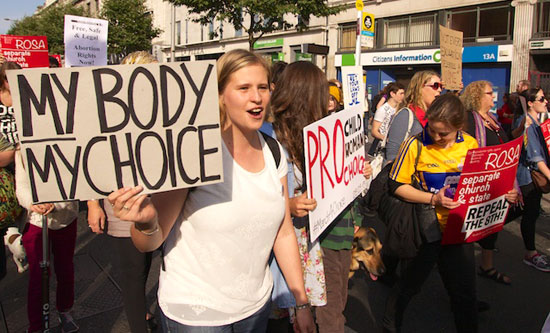
UPDATE: In June 2017, the Supreme Court upheld the High Court ruling of May 2014, detailed below, which denies women from the north of Ireland provision of an abortion free of charge by the NHS in England. The judges rejected the appeal with a three to two majority, with those dismissing the case reporting their ‘respect to the democratic decision of the people of Northern Ireland’ and arguing that accepting the appeal would increase ‘health tourism’ and ‘a near collapse of the edifice of devolved health services’.
Encouraged by the decision of the two judges who recognised their appeal however, the women are planning to file an application with the European Court of Human Rights in Strasbourg ‘to protect the human rights of the many other women who make the lonely journey to England every week because they are denied access to basic healthcare services in their own country’.
At a time of Tory negotiations with the anti-abortion Democratic Unionist Party (DUP), of ever-increasing restrictions, checks and charges for NHS used more widely for migrants, refugees and visitors, and of restrictions to funding for women’s health charities, access to free and safe abortion and wider care is increasingly under attack. Working class women unable to pay for private care will continue to struggle – and the demand for free, safe accessible abortion for all must continue.
The original case details
‘She was able to access such services, albeit they were those provided privately by an independent clinic, outside the NHS for a fee, and no obstacles were put in her way in this regard’ – Mr Justice King at the High Court ruling.
In this High Court ruling in London on 8 May 2014, Mr Justice King reaffirmed that women from the north of Ireland are not entitled to an abortion free of charge provided by the NHS in England. In the Six Counties, abortion remains a criminal act. Access to an abortion remains entirely dependent on the ability to pay for travel, accommodation, and a private procedure. The verdict was a blunt dismissal of the realities of poverty, work, childcare and lack of reproductive health rights for working class women.
The case was brought to court by a young woman who wanted to stop NHS abortions from being withheld from women in the north of Ireland. Pregnant at 15, she had struggled to raise the money necessary for her own abortion in England, despite the support of her mother and the Abortion Support Network. The case challenged the use of private clinics where prices range from £400-£2000 – and whilst a victory would have meant women would still have to pay to travel for abortion, it would have set an important precedent. The number of women seeking abortions after 20 weeks with help from Abortion Support Network stands at 7% in the north of Ireland, compared to 1.4% in England. Women unable to consider the cost of an abortion or travel face the cost of rearing a child they know they cannot afford in a society that increasingly offers judgment and isolation rather than support.
A letter from the Secretary of State for Health in England, Jeremy Hunt, was presented during the case: ‘The NHS should not fund services for residents of Northern Ireland which Northern Ireland’s Assembly has deliberately decided not to legislate to provide, and which would be unlawful if provided in Northern Ireland.’ His position is clear: a woman’s postcode, and the law that appears to follow her to England, comes before her health needs. In addition, the 1861 law governing abortion in the north of Ireland has yet again been validated in an overwhelming confirmation of the status quo. The High Court concluded that Hunt had fulfilled his obligation to ensure accessible abortion, asserting that access to health care should be determined by ability to pay.
A legal abortion is almost impossible to obtain within the north of Ireland, even for women who have been raped, or when there are fatal foetal abnormalities. The options are limited and have serious consequences – keeping an unwanted pregnancy, seeking a potentially dangerous illegal abortion and risking criminalisation, or to travel. More than 1,000 women each year travel from the north of Ireland to access abortion.
The need to travel for abortion is an international issue, with Department for Health figures showing that 5,850 non-resident women had abortions in Britain in 2012. Women from Catholic countries where abortion rights are limited have to travel hundreds of miles from all over Europe. Spain is introducing yet more restrictive legislation on abortion rights which will force an estimated 30,000 women to travel and many more to undergo dangerous ‘backstreet’ abortions. For many working class women, especially asylum seekers, in places such as Spain and the Six Counties the option to travel does not exist. Mara Clarke, founder of Abortion Support Network, explains the situation well: ‘Women with money have options, women without money have babies.’
Access to abortion is first and foremost a matter of class in a system where ‘choice’ is defined by ability to pay. The demand at the heart of the hearing was free, accessible health care for all – the answer a resounding ‘no’. The young woman in the Six Counties plans to appeal – and the wider struggle will continue.
Rachel Francis




